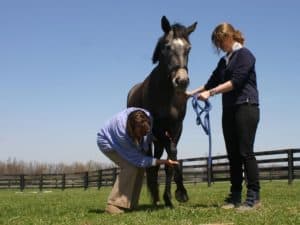Epiglottic Abnormalities in Nonracehorses: A Review
When a riding horse develops a cough or a runny nose, or when he begins having trouble making it through a previously easy workout, owners often seek a cause and a cure. And while respiratory ailments such as a lower respiratory disease might seem a likely culprit in these cases, a team of University of Pennsylvania researchers suggests that sometimes such clinical signs can be linked to epiglottic abnormalities. In a recently completed study the team characterized these epiglottic problems—which are commonly detected in racehorses—and their impact on nonracehorses.
"To our knowledge, clinical abnormalities and outcome of treatment in mature nonracehorses with epiglottic abnormalities have not been reported previously," said Eric J. Parente, DVM, Dipl. ACVS, associate professor of surgery at the New Bolton Center campus of the University of Pennsylvania’s School of Veterinary Medicine, in Kennett Square, Pa.
When a horse swallows food or water, the epiglottis (a movable, leaf-shaped piece of cartilage located at the base of the tongue and above the soft palate) covers the opening of the larynx to ensure that food and water do not enter the trachea, but instead pass into the esophagus. Parente and Maia R. Aitken, DVM, a resident in the department of clinical studies at New Bolton, listed some of the most common epiglottic abnormalities found in racehorses:
- Epiglottic entrapments (when the epiglottis becomes trapped by the aryepiglottic folds of tissue and cannot move);
- Epiglottic hypoplasia (incomplete development of the epiglottis);
- Subepiglottic cysts (a cyst on or near the epiglottis);
- Subepiglottic granulomas (tissue similar to "proud flesh" in a wound, under the epiglottis, often caused by some sort of trauma to the area);
- Epiglottitis (inflammation of the epiglottis); and
- Epiglottic abscesses.
To examine the impact of epiglottic abnormalitites on the respiratory function of nonracehorses, the team performed a retrospective study employing 23 mature horses (those more than eight years of age) with such anomalies. Referring veterinarians had examined these horses previously before New Bolton admission from April 1990 to August 2009. The horses (16 geldings and 7 mares of six breeds) were used for a variety of disciplines, including pleasure riding, all-purpose riding, dressage, show jumping, polo, and pleasure driving. Four of the horses were retired at the time of referral
Create a free account with TheHorse.com to view this content.
TheHorse.com is home to thousands of free articles about horse health care. In order to access some of our exclusive free content, you must be signed into TheHorse.com.
Start your free account today!
Already have an account?
and continue reading.

Written by:
Erica Larson
Related Articles
Stay on top of the most recent Horse Health news with












